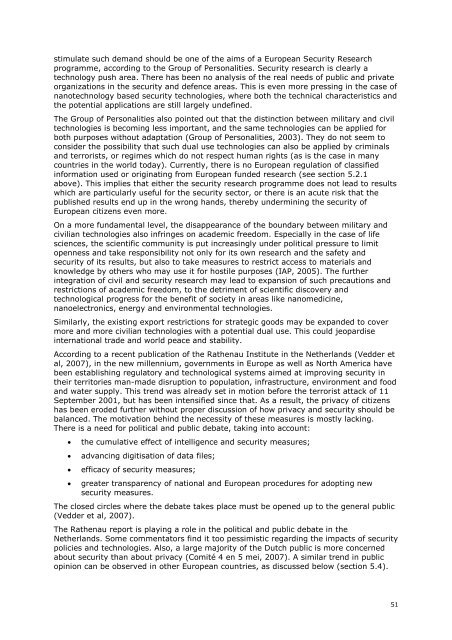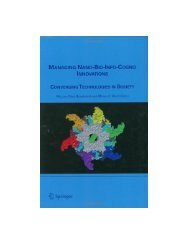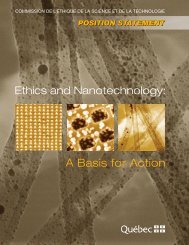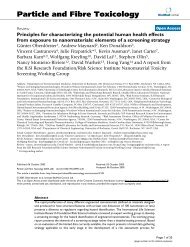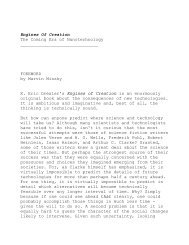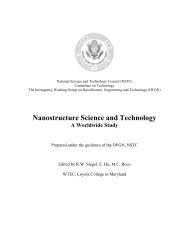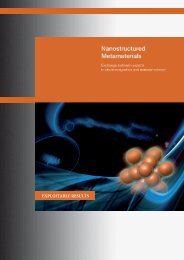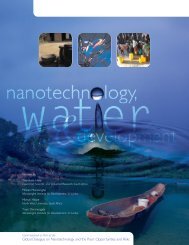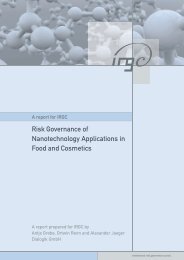Download - Nanowerk
Download - Nanowerk
Download - Nanowerk
You also want an ePaper? Increase the reach of your titles
YUMPU automatically turns print PDFs into web optimized ePapers that Google loves.
stimulate such demand should be one of the aims of a European Security Research<br />
programme, according to the Group of Personalities. Security research is clearly a<br />
technology push area. There has been no analysis of the real needs of public and private<br />
organizations in the security and defence areas. This is even more pressing in the case of<br />
nanotechnology based security technologies, where both the technical characteristics and<br />
the potential applications are still largely undefined.<br />
The Group of Personalities also pointed out that the distinction between military and civil<br />
technologies is becoming less important, and the same technologies can be applied for<br />
both purposes without adaptation (Group of Personalities, 2003). They do not seem to<br />
consider the possibility that such dual use technologies can also be applied by criminals<br />
and terrorists, or regimes which do not respect human rights (as is the case in many<br />
countries in the world today). Currently, there is no European regulation of classified<br />
information used or originating from European funded research (see section 5.2.1<br />
above). This implies that either the security research programme does not lead to results<br />
which are particularly useful for the security sector, or there is an acute risk that the<br />
published results end up in the wrong hands, thereby undermining the security of<br />
European citizens even more.<br />
On a more fundamental level, the disappearance of the boundary between military and<br />
civilian technologies also infringes on academic freedom. Especially in the case of life<br />
sciences, the scientific community is put increasingly under political pressure to limit<br />
openness and take responsibility not only for its own research and the safety and<br />
security of its results, but also to take measures to restrict access to materials and<br />
knowledge by others who may use it for hostile purposes (IAP, 2005). The further<br />
integration of civil and security research may lead to expansion of such precautions and<br />
restrictions of academic freedom, to the detriment of scientific discovery and<br />
technological progress for the benefit of society in areas like nanomedicine,<br />
nanoelectronics, energy and environmental technologies.<br />
Similarly, the existing export restrictions for strategic goods may be expanded to cover<br />
more and more civilian technologies with a potential dual use. This could jeopardise<br />
international trade and world peace and stability.<br />
According to a recent publication of the Rathenau Institute in the Netherlands (Vedder et<br />
al, 2007), in the new millennium, governments in Europe as well as North America have<br />
been establishing regulatory and technological systems aimed at improving security in<br />
their territories man-made disruption to population, infrastructure, environment and food<br />
and water supply. This trend was already set in motion before the terrorist attack of 11<br />
September 2001, but has been intensified since that. As a result, the privacy of citizens<br />
has been eroded further without proper discussion of how privacy and security should be<br />
balanced. The motivation behind the necessity of these measures is mostly lacking.<br />
There is a need for political and public debate, taking into account:<br />
• the cumulative effect of intelligence and security measures;<br />
• advancing digitisation of data files;<br />
• efficacy of security measures;<br />
• greater transparency of national and European procedures for adopting new<br />
security measures.<br />
The closed circles where the debate takes place must be opened up to the general public<br />
(Vedder et al, 2007).<br />
The Rathenau report is playing a role in the political and public debate in the<br />
Netherlands. Some commentators find it too pessimistic regarding the impacts of security<br />
policies and technologies. Also, a large majority of the Dutch public is more concerned<br />
about security than about privacy (Comité 4 en 5 mei, 2007). A similar trend in public<br />
opinion can be observed in other European countries, as discussed below (section 5.4).<br />
51


